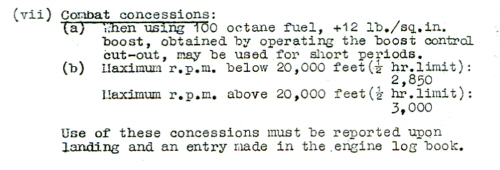Quote:
Originally Posted by Crumpp

The language is clear. A logbook entry in the maintenance logs followed by an inspection is required.
To translate that to non-pilots and A&P's....that means the aircraft is automatically grounded until a mechanic inspects the engine and returns it service.
|
The "language" does not state that and the pilot's notes for the Merlin III state:

and this requires a pilot to log and report the use of combat power.
Dowding's memo states:
"
5. The consequences of exceeding the engine limitations are liable to manifest themselves on some subsequent occasion, perhaps during night flying or over the sea out or gliding distance from land. Pilots therefore, are to be instructed not to exceed;
(i) Maximum specified temperatures for oil and engine coolant.
(ii) Limit of 5 mins. for maximum of 3000 r.p.m. at 6.25 lbs/sq.in. or more.
6. It is in the interests of pilots themselves, when operations With the enemy may have resulted in engine limitations being exceeded, to acquaint the maintenance personnel with the facts, so that oil filters may be inspected at the first convenient opportunity to investigate whether damage to the bearings has resulted."
"...first convenient opportunity..." during wartime is hardly grounded until inspected.
and:
http://www.wwiiaircraftperformance.org/ap1590b.jpg
states
"
11. The use, in an emergency, of this high boost pressure is a definite overload condition on Merlin engine and therefore all occasions on which it is essential to make use of the + 12 lb must be reported by the pilot and recorded in the engine log book so that the engineer officer may be able to assess the reduction in life between overhauls and the need for special inspections. "
"...recorded in the engine log book so that the engineer officer may be able to assess the reduction..." leaves it to the discretion of the engineer officer to decide whether an inspection is needed. In no way does this call for mandatory inspections.
and none of these calls for grounding the aircraft until an inspection is made. Rather these call for assessments and inspections as needed depending on the entries in the log books and thus presumably the duration and circumstances under which 12lb/3000rpm was used.
Dowding's memo specifically states that operation at 12lb/3000rpm for 5 minutes or less does not need to be reported to maintenance personnel.
Again, the average life of a BofB RAFFC fighter was less than 2 months, so no one was unduly concerned about the use of 12lb/3000rpm in combat situations since the average fighter never survived long enough for engine life to be a major issue. Since about 1000 fighters were lost and something like 60,000 sorties were flown during the battle, the average RAFFC fighter probably had less than 100 hours on the clock when lost. Dowding's memo, for example, does not mention admin penalties for exceeding 5mins at 12lb/3000 rpm but merely states that they not do so, and to report the time when they do.